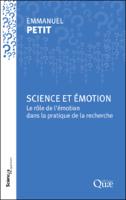Science et émotion
Le rôle de l'émotion dans la pratique de la recherche
Abstract
The history of science is littered with the lives of famous scientists, such as Charles Darwin, Marie Curie or Albert Einstein, who have recounted their passion for research and the emotions that contributed to it. Generally speaking, all researchers know the intellectual pleasure associated with their professional activity. Most are fervently committed to their work and take it to heart to convince the community and/or the general public of its relevance and importance. Few researchers, however, recognise that their emotions can affect the way they approach their research, or the way they practice it. Do emotions affect the choice of the object of study or the choice of tools? Do they influence the reading and interpretation of scientific results or facts? Should or can the researcher control his or her emotions or try to put them at a distance? Or should they have a place in the research process itself? Is an emotion an appropriate source of scientific knowledge? How should emotions be evaluated? This book proposes to answer all these questions.
Keywords
history; philosophy; research; sociology; scientific activity; emotion; epistemologyDOI
10.35690/978-2-7592-3548-3ISBN
9782759235476, 9782759235483, 9782759235490, 9782759235476Publisher
éditions QuaePublication date and place
2022Classification
History of science


 Download
Download